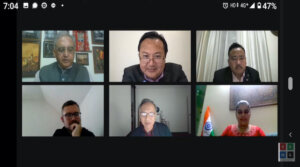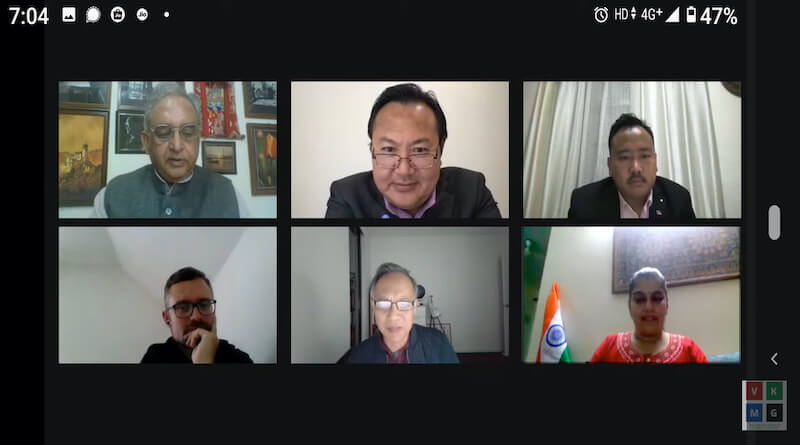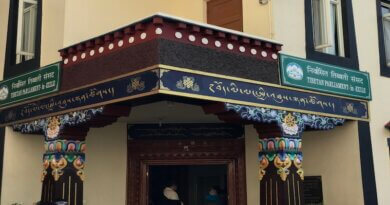A SOLID ALLIANCE OF ALL CHINESE COLONIES AND THREATENED COUNTRIES IS NEEDED TO END CHINESE COLONIALISM

By: Vijay Kranti
New Delhi, Prague, Washington DC, New York, Munich, Taipei, Sydney and Dharamshala – 13th August Leaders of China’s major colonies like Tibet, East Turkistan (Xinjiang), Southern Mongolia, Hong Kong and experts belonging to Taiwan, democracy movement of China and European Parliament have expressed an opinion that international unity and a solid alliance between these colonies hold the hope for the collapse of the communist regime and hence the freedom of these colonies.
These leaders and experts met on a rare common platform organized by the Centre for Himalayan Asia Studies and Engagement (CHASE) and Tibetan Youth Congress (TYC) in the late evening of Saturday, the 13th of August to exchange views on the subject “WILL CHINA’S COLONIES CELEBRATE INDEPENDENCE DAY SOON?” The webinar was moderated by Vijay Kranti, a veteran journalist, Tibetologist and Chairman of CHASE. Those experts who participated are:
In his inaugural presentation Makulas Peksa, a prominent Czech member of the European Parliament who is also the Chairman of its ‘Tibet Interest Group,’ cited examples of various colonial powers of Europe during recent centuries and how they finally collapsed because of their immoral conduct with their colonies and the resulting resistance of their subjects. “China and Russia are the only two surviving colonial powers today. In the view of ongoing Ukraine war and serious corruption in Russia it may not survive beyond a decade. But China’s case seems somewhat more complicated because it is the biggest empire of our days and has huge industrial resources and a big manpower base,” he said.
He referred to China’s attempts at interfering in the democratic process of other countries, including his own country, by using corrupt means to influence individual political leaders and occupying strategically important companies. “But the push back has started happening. We may not be in a position to say today that the Chinese empire is going to collapse but we are now reaching a phase where the Chinese empire is getting isolated and is being pushed back by those who are forming global alliances against China as the fear of Chinese aggression is binding them. I see it as the beginning of the end. The world is now realizing what happened in Tibet, East Turkistan, Southern Mongolia or Manchuria and Hong Kong. Same can happen in other countries and it must be prevented. I think that the only way to bring peace to the rest of world is the independence of the current colonies of China,“ he said.
In the webinar the case of Hong Kong was presented by Edward CK Chin who is a popular political-social commentator of Hong Kong and is the Convener of the activist group named as “2047 Hong Kong Monitor” which advocates the case of democratic movement of the island city-country. In this title the number “2047” stands for the year 2047 when Hong Kong was supposed to finally join China on completion of the transfer agreement between the British and Chinese governments in 1997. Chin, whose two YouTube channels ‘Ed Chin World’ and ‘Ed Chin Voice’ are popular among the democracy lovers of Hong Kong and their supporters, equated the 2019 action of Chinese government in Hong Kong with what happened in Tibet in 1959 and at Tian-Anmen Square of Beijing in 1989.
Reflecting the intensity of anger and hopelessness among the citizens of Hong Kong with the Beijing government and the Communist Party of China (CPC) he said that half a million citizens have already left the island city to start afresh in other countries. “If the push comes to a shove then at least fifty percent of the population of Hong Kong will wind up its businesses and homes and migrate to other countries,” he added. He focused on the social disaster caused by the dreaded ‘National Security Law’ which was passed and signed by the Standing Committee of the Chinese ‘Parliament’ in Beijing and implemented on the same day on Hong Kong on 30th June 2020. He said, “Innumerable business people and democracy lovers who opposed Chinese steps like this law, are languishing in jails without any hope for their lives.” He called upon the international community to join hands and come to the help of such Hong Kongers.
Dolkun Isa, one of the most prominent Uyghur leaders, dedicated to the non-violent freedom movement of East Turkistan (Ch: ‘Xinjiang) and President of World Uyghur Congress, participated in the webinar as a representative of Uyghur nation. He said that “China’s colonial system has brought with it unspeakable suffering and misery for the Uyghur people, like so many other ethnic and religious groups who share a history of violent colonial occupation at the hands of the Chinese. The crimes against humanity and genocide that the Uyghur people are currently facing are direct consequences of the colonial occupation of East Turkistan, in 1949.”
“Among many atrocities which the people of East Turkistan are facing at the hands of China and its Communist Party, crimes against the Uyghur women are unimaginable in the free and democratic countries. The most atrocious example has been its occupation of the bodies and reproductive rights of Uyghur women by the Chinese government,” he said. “By implementing a region-wide policy of mass sterilization and forced abortions, and subjecting Uyghur women in the concentration camps to systematic rape, sexual abuse, and torture, the Chinese government is invading the very core of the Uyghur people’s future, and endangers the next generation of Uyghurs,” he added. In the long-term, this policy of China will lead to the loss of millions of Uyghur births, putting the future existence of the Uyghurs as a people at risk, he added.
Enghebatu Togochog, is the Director of the ‘Southern Mongolian Human Rights Information Center’ (SMHRIC) which is based in New York and is dedicated to promoting and protecting human rights of the Mongolian people in the Chinese-occupied Southern Mongolia. Referring to the history Engebatu informed the audience that Southern Mongolia, called as ‘Inner Mongolia’ by China, was the first country to be occupied by modern China and was made its first colony in 1919. “The history of my nation is a textbook example of how modern imperialism and colonialism can work hand in hand to destroy a nation, crumble its economy and wipe out its culture. The most effective colonial strategy that China has applied in Southern Mongolia can be roughly summarized in four major categories: economic ‘development’, population transfer, gradual Sinicization and resource extraction.”
Speaking about the use of population transfer by China as an effective and a well-planned tool of colonialism and ‘Cultural Genocide’ Enghebatu said, “Over the history Chinese have been crossing over to Southern Mongolia as famine refugees and ‘banished intellectuals’ or ‘Production and construction corps’ of CPC. But the latest form of population transfer has taken place in the name of ‘Western Development’, ‘urbanization’, ‘inviting investors’ and ‘recovering ecosystem’. As a result of these nonstop Chinese migrations, the population ratio of 5 Mongolians to 1 Chinese before the annexation has been reversed to 1 Mongolian to 5 Chinese today. Strikingly similar patterns are seen in the Belt and Road Initiative countries where China refuses to hire from native populations but brings in Chinese workers to create their own colony.”
The presentation of Professor Yung-Ming Yen, an associate professor in the Department of Political Science at Tunghai University, Taiwan, was focused on two subjects. One was on tight control of Beijing over its occupied colonies; it’s ever increasing capability to manipulate ‘public diplomacy’ in the democratic and open societies; as well as its strategic dominance of the international agencies like the United Nation to control the impact of their decisions against China’s human rights record. His other focus was on the present situation caused by China’s military action around Taiwan.
Pointing out at the tight physical control of China over its colonies like Tibet, East Turkistan and Southern Mongolia, Prof. Yen was of the opinion that it would not be easy for these countries to win their independence from China on their own. He said, “China has adopted a strategy of manipulating the ‘public diplomacy’ in those open and democratic countries that can be a source of support for the Chinese colonies. China invested 45 billion Yuan in 2009 to exploit the openness of these societies to infiltrate and buy influence in their popular media which influence public opinion”. He gave examples of newspapers like the New York Times and Guardian in which it purchased space and delivered its own propaganda through their pages.
“Similarly in most of international agencies like the UN’s Human Rights Council China has increased its influence to such an extent that it can block any resolution or decision which goes against China’s colonial interests. It has been also able to push such agenda through these agencies which is suitable to its own interests,” he pointed out.
Sharing his experience last fortnight when China conducted threatening live military exercises around Taiwan Prof. Yen said, “Had you been in a Taiwan street in those days you would have been surprised to see that the life was going as normal even when China was firing missiles across the Taiwanese water and air boundaries. Some people could criticize this as lack of awareness for public safety. But we Taiwan people have been used to such acts of China since years.”
“A democratic Taiwan is a sharp contrast to the China of CPC. It has shown them (CPC) that democratic way of life is very much possible and feasible in a ‘Sinofic’ society. This is what the communist rulers of Beijing cannot tolerate and want to take over this island. But we the people of Taiwan are determined to protect and defend our freedom and democracy,” he concluded.
Dr. Chin Jin, a prominent voice of the democracy movement of China and is Secretary General of the ‘Federation for a Democratic China’. He was of the opinion that as long as the Communist Party of China is in power, no colony of present day China can hope for its freedom or liberation. “As long as the CPC continues to rule China, places like Tibet, Xinjiang, Inner Mongolia and Hong Kong would be in no way liberated. The prerequisite for the independence or liberation of these regions is that the CPC no longer exists. If this prerequisite does not exist, the independence or liberation of Tibet, Xinjiang, Southern Mongolia, and Hong Kong is nothing more than an unrealistic fantasy,” he said.
In the webinar Tibet’s case was presented by Gonpo Dhundup, the President of Tibetan Youth Congress which is the largest socio-political organization of the Tibetan diaspora. As also the co-host of this unique event Gonpo underlined the timing of this event. Being organized on the eve of 75th anniversary of Indian independence which is being celebrated after two days on 15th August, Gonpo said that all colonies of China have a great scope of learning and maintaining hope from the freedom struggle of India. This freedom struggle went on for two centuries and ended up with the defeat of Great Britain which was a much larger and stronger colonial power that what China is today.
Gonpo traced the history of freedom struggle of Tibetan people against Chinese colonial regime since early 1950s to this day. “China tried to tame and convert Tibetan people into ‘Chinese patriots’ through strong coercion and cultural destruction during the 1960-1980 period of ‘Cultural-Revolution’ and its follow-up but failed. The Tibetan uprising of 1987 and 1989 was a proof that Tibetan people’s determination for freedom is alive and strong. Chinese tried to bribe the Tibetan mind by promising some liberalization and economic development. But the massive uprising of the new generation of Tibetans across all three provinces of U-Tsang, Kham and Amdo in 2008 proved once again to the Chinese rulers that the fire of freedom has rather grown in Tibetan hearts. Although very severe controls and electronic surveillance in the following years have seriously impacted the movement of Tibetans even in their own homeland yet self-immolation by at least 159 Tibetan youths, monks and nuns in recent years has shown to the world that the Tibetan people’s determination to win back their national freedom is alive,” he said.
In conclusion Gonpo said that, “To make China accountable for all their misconduct we all oppressed nations like Tibet, East Turkistan, Southern Mongolia, Manchuria, Taiwan and Hong Kong should come together to make a solid alliance to reach out to the world with right information about what is going on inside our countries and win the support of the world.”
To conclude the webinar Prof. Aayushi Ketkar of JNU, an expert in international relations and security issues presented the vote of thanks.
The author is a senior journalist and a Tibetologist. He is presently the Chairman of the Centre for Himalayan Asia Studies and Engagement, New Delhi. He can be contacted at v.kranti@gmail.com | www.vijaykranti.com. | +91 9810245674.





